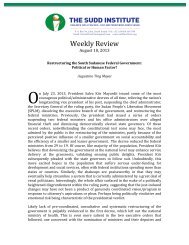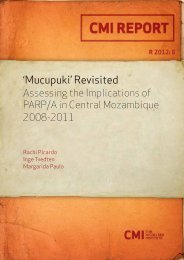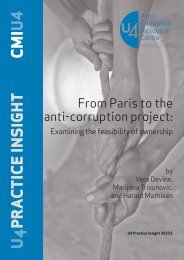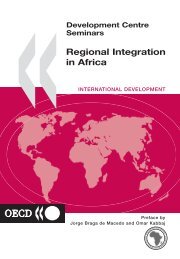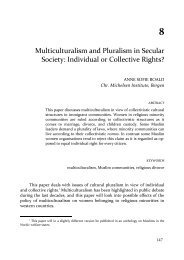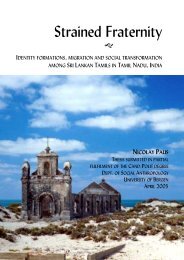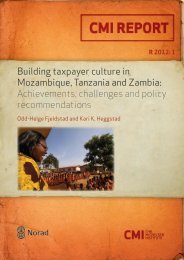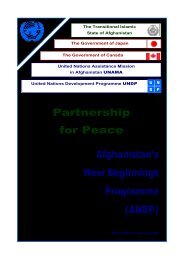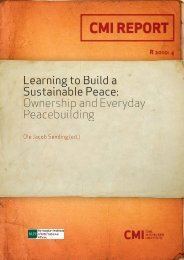Peacebuilding: Lessons for Afghanistan? - CMI
Peacebuilding: Lessons for Afghanistan? - CMI
Peacebuilding: Lessons for Afghanistan? - CMI
Create successful ePaper yourself
Turn your PDF publications into a flip-book with our unique Google optimized e-Paper software.
international humanitarian law, as specified in the Bonn Agreement, is important <strong>for</strong><br />
affirming standards, but obviously insufficient.<br />
The UN has previously made a significant ef<strong>for</strong>t to promote standards of governance<br />
and human rights in <strong>Afghanistan</strong>. While discouraging, the record is not entirely bleak.<br />
5.2. Strategic framework and principled common programming<br />
Until the late 1990s, the UN or the international aid community did little to promote<br />
standards of governance in <strong>Afghanistan</strong>. During the 1980s, the overriding goal of<br />
Western states and aid agencies was to empower the mujahedin to fight the Soviets.<br />
When the victorious mujahedin turn their weapons on each other, their remaining<br />
external supporters sought to promote the power of their factions rather than modify<br />
their principles of rule. UN aid agencies and other aid actors provided humanitarian<br />
relief to the civilian population; qua emergency assistance it was not linked to<br />
political or human rights conditionality.<br />
Over time, however, the humanitarian aid community became increasingly concerned<br />
that it was contributing to the war by providing relief and social services to the<br />
people, thereby freeing up resources <strong>for</strong> the warlords to continue fighting. Direct<br />
appropriations of supplies deepened the concern. A discussion on conditionality<br />
gradually emerged in the aid community. Some argued <strong>for</strong> negative conditionality, i.e.<br />
that only minimal life-saving assistance be provided unless the fighting stopped.<br />
Others advocated making assistance a reward <strong>for</strong> good behaviour (such as a truce) or<br />
linking it to participation in desired projects in the logic of positive conditionality. 55<br />
The critical rethinking in the aid agencies eventually matured in the <strong>for</strong>m of the<br />
Strategic Framework. The initiative was approved at the highest agency level by a<br />
decision in the Administrative Committee on Coordination (ACC) in early 1997 to<br />
integrate political strategy and humanitarian assistance in a coherent framework.<br />
Relief and aid <strong>for</strong> recovery in the longer run would be linked to a joint ef<strong>for</strong>t to<br />
promote peace. An inter-agency mission with NGO representation, and led by the UN<br />
Department of Political Affairs, followed to mobilise support in the aid community<br />
working out of Pakistan and in <strong>Afghanistan</strong>. A parallel initiative among the donors<br />
had reached a similar conclusion at the Ashkabad meeting in January 1997. When the<br />
Strategic Framework and Principled Common Programming were launched the<br />
following year, the initiative consequently commanded broad agreement in the aid<br />
community.<br />
As a UN-centred initiative, the Strategic Framework rested on certain overarching<br />
goals. The UN would promote peace and human rights in <strong>Afghanistan</strong>, and<br />
simultaneously "increase the capacity of the Afghan people to determine their own<br />
priorities." 56 To this end, the aid actors would subscribe to seven guiding principles<br />
55 For reactions in the aid community, see Paula R. Newburg "Politics at the Heart. Organizing<br />
International Assistance to <strong>Afghanistan</strong>." Carnegie Endowment <strong>for</strong> International peace. Washington<br />
D.C. February 1999. Unpublished paper. Positive conditionality was tried in a small way in the early<br />
1990s under the first UN coordinator <strong>for</strong> assistance (UNOCA), Sadruddin Aga Khan. Distribution of<br />
wheat, <strong>for</strong> instance, was in some areas tied to a dialogue or truce among local rivals.<br />
56<br />
The UN would:<br />
• promote political negotiations within <strong>Afghanistan</strong> and with neighbouring states aimed at ending<br />
hostilities<br />
32



